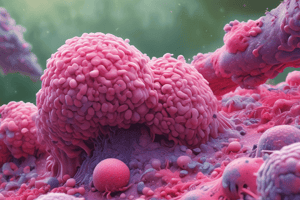Podcast
Questions and Answers
Which of the following cell types is primarily responsible for antigen presentation in D-MALT?
Which of the following cell types is primarily responsible for antigen presentation in D-MALT?
- Mucosal epithelial cells
- Dendritic cells (correct)
- Follicular dendritic cells
- Macrophages
What is the primary mechanism by which D-MALT induces tolerance to commensal microorganisms?
What is the primary mechanism by which D-MALT induces tolerance to commensal microorganisms?
- Via the induction of T cell anergy
- By promoting the differentiation of Tregs (correct)
- Through the production of regulatory T cells
- Through the activation of Th2 cells
What is the primary function of D-MALT in the mucosal immune system?
What is the primary function of D-MALT in the mucosal immune system?
- To stimulate the differentiation of naïve T cells into effector T cells
- To facilitate the extravasation of leukocytes into the mucosal tissue
- To induce the production of secretory IgA antibodies (correct)
- To enhance the phagocytic activity of mucosal dendritic cells
Which of the following cytokines is primarily involved in the development of D-MALT?
Which of the following cytokines is primarily involved in the development of D-MALT?
What is the primary function of the organized lymphoid structures in D-MALT?
What is the primary function of the organized lymphoid structures in D-MALT?
What is the primary mechanism by which keratinocytes regulate the immune response in the mucosal immune system?
What is the primary mechanism by which keratinocytes regulate the immune response in the mucosal immune system?
How do keratinocytes contribute to the development of mucosal tolerance?
How do keratinocytes contribute to the development of mucosal tolerance?
What is the primary function of keratinocyte-derived cytokines in the mucosal immune system?
What is the primary function of keratinocyte-derived cytokines in the mucosal immune system?
How do keratinocytes interact with dendritic cells in the mucosal immune system?
How do keratinocytes interact with dendritic cells in the mucosal immune system?
What is the consequence of keratinocyte dysfunction in the mucosal immune system?
What is the consequence of keratinocyte dysfunction in the mucosal immune system?
Flashcards are hidden until you start studying
Study Notes
Antigen Presentation in D-MALT
- Dendritic cells are primarily responsible for antigen presentation in diffuse mucosal-associated lymphoid tissue (D-MALT).
Inducing Tolerance in D-MALT
- D-MALT induces tolerance to commensal microorganisms primarily through mechanisms that downregulate immune responses and promote regulatory T cell (Treg) formation.
Function of D-MALT in Mucosal Immune System
- D-MALT plays a critical role in the mucosal immune system by recognizing and responding to pathogens while maintaining tolerance to non-harmful microbes.
Cytokines and D-MALT Development
- The development of D-MALT is primarily driven by the cytokine IL-17 (interleukin 17), which is crucial for the maturation and function of these lymphoid structures.
Organized Lymphoid Structures in D-MALT
- Organized lymphoid structures in D-MALT primarily function to facilitate the activation and proliferation of lymphocytes in response to antigens.
Role of Keratinocytes in Immune Regulation
- Keratinocytes regulate the immune response in the mucosal immune system by producing a range of cytokines and expressing surface molecules that modulate immune cell activity.
Keratinocytes and Mucosal Tolerance
- Keratinocytes contribute to the development of mucosal tolerance by secreting factors that promote tolerance and reduce inflammatory responses toward commensal organisms.
Keratinocyte-Derived Cytokines
- Keratinocyte-derived cytokines serve to activate and regulate T cells, influencing the balance between tolerance and immunity in the mucosal immune system.
Interaction of Keratinocytes with Dendritic Cells
- Keratinocytes interact with dendritic cells through cytokine signaling and direct cell-to-cell contact, enhancing the dendritic cells' ability to present antigens and initiate immune responses.
Consequences of Keratinocyte Dysfunction
- Dysfunction in keratinocytes can lead to impaired immune regulation, resulting in increased susceptibility to infections and heightened inflammatory responses in the mucosal immune system.
Studying That Suits You
Use AI to generate personalized quizzes and flashcards to suit your learning preferences.




